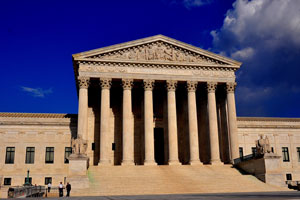The Supreme Court had heard oral argument in the case of Duane Buck, a Texas murderer who was convicted after an expert witness testified that he was more dangerous because he was black.
The Conviction
Duane Buck was convicted of the murder of his girlfriend, Debra Gardner, and a man he believed she was having an affair with. He also shot his own stepsister. The shootings took place in front of Gardner’s children.
At his trial, Buck’s attorney, Jerry Guerinot, called psychologist Walter Quijano as an expert witness. Quijano testified that Buck was statistically most likely to commit future crimes because he was black. The propensity to commit future crimes is a key element in a death penalty sentence in Texas. Buck was sentenced to death.
Appeals Process
Buck’s conviction and death sentence were affirmed by Texas courts. His appellate attorney did not raise the issue of the racist testimony introduced by his attorney at trial. The federal appeals courts rejected this argument because it had not been raised in a timely manner in the Texas courts.
Buck sought relief under Federal Rule of Civil Procedure 60(b)(6), which allows a court to grant relief from a final judgment in an “extraordinary circumstance.”
The federal district court and the 5th Circuit Court of Appeals denied relief. The Supreme Court granted certiorari.
Oral Argument Before the Supreme Court
Buck’s attorney through the NAACP, Christina Swarns, argued that Buck had been sentenced to death based upon “a false and pernicious group-based stereotype. Texas Solicitor General Scott Keller defended the appellate ruling and said that there was ample evidence to support a death sentence.
The Justices appeared to be in agreement that the court would rule in Buck’s favor. Justice Steven Breyer stated that the facts of Buck’s case “proves the arbitrariness of what’s going on out there.” Justice Ruth Bader Ginsburg said, “Doesn’t it show how abysmal his counsel was?” Justice Samuel Alito noted that, “What occurred at the penalty phase of this trial is indefensible.”
Reaction
Director Counsel for the NAACP Legal Defense & Educational Fund, Sherrilyn Ifill, stated that, “We are all at risk when our justice system allows prosecutors and juries to exercise lethal discretion based on race… Duane Buck’s case is as much about his own unlawful death sentence as it is about the ability of Harris County’s criminal justice system to produce outcomes free from the taint of racial discrimination.”
Legal commentator and Harvard Law School lecturer, Ian Samuel, noted that the courts are generally sympathetic to a petitioner such as Buck. “If you have a legitimate claim of ineffective assistance of counsel in a death penalty case, especially at the penalty phase, then there is no procedural obstacle on this earth that the Court is going to regard as sufficient to stop you from bringing that forward.”
After oral argument, Buck’s stepsister Phyllis Taylor, whom he shot, told reporters that she supports him and hopes that his death penalty conviction is vacated.




